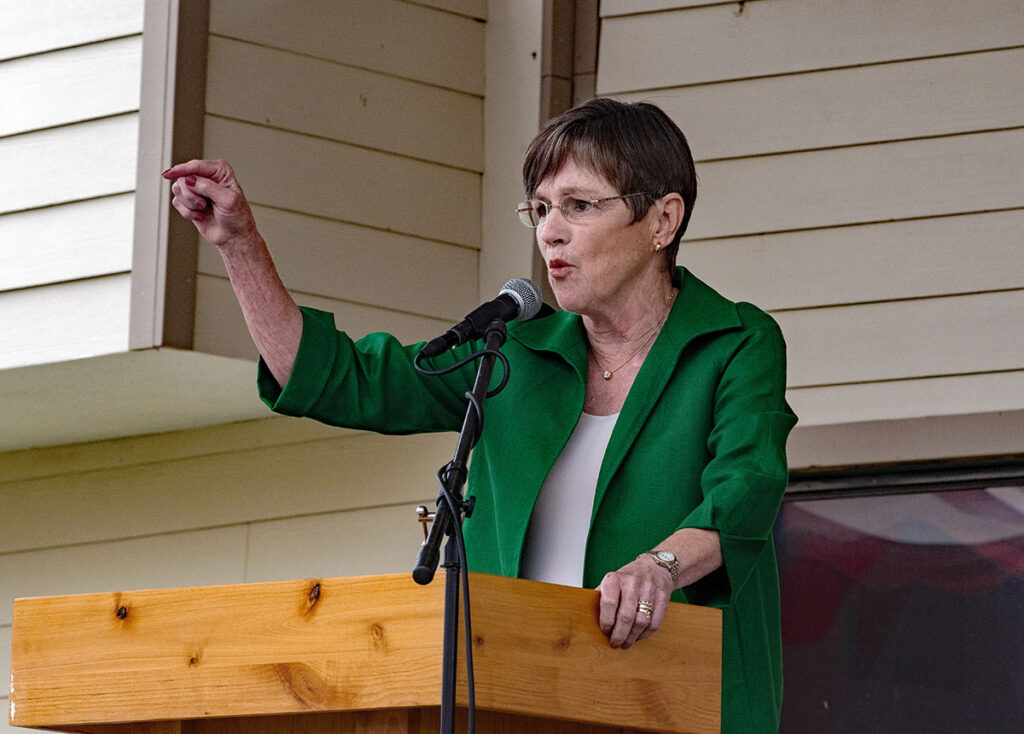Remember Governor Laura Kelly’s campaign promises of bipartisanship, transparency, and doing what’s right for the people of Kansas? Observing her in the legislature over the years made clear it was hogwash, and that it would only be a matter of time before showing her true colors. Her recent vetoes did exactly that.
This isn’t a Democrat/Republican or conservative/liberal thing. We tried taking her up on her offer to work ‘across the aisle’ (still waiting for a response on that) and we commended her efforts to waive regulations during the ongoing COVID situation. Conservatives also know that we routinely criticized Governor Sam Brownback for failing to reduce the cost of government, among other topics.
Laura Kelly, you see, is all about growing government. She cares little about the families working in the private sector and business owners who pay the cost of government. She pretty much said as much at the Kansas Chamber’s annual dinner earlier this year, when many in attendance were appalled by her open disdain for the business community.
Last week, she vetoed House Bill 2054, which provided legislative oversight to her emergency management authority, spending of federal COVID funds, and also provided much-needed liability protection for healthcare workers and businesses. Kelly vetoed that bill because she doesn’t want legislators and taxpayers interfering with her authority.
She did it again yesterday when, with her vetos of bipartisan legislation, – that passed with veto-proof majorities in both Chambers – she cavalierly ignored people struggling economically as a result of her statewide shutdown order over the COVID situation. Her overarching message was, “Look, I know you’re all suffering, but nothing shall get in the way of state and local government getting our what we’re due.”
Oh, she didn’t quite put it that way, but it was pretty close.
Property tax reform vetoed
On vetoing House Bill 2702, which would have waived penalties on interest on property tax payments due May 10 provided they’re paid by August 10, she said, “Local governments rely heavily on property taxes to fund essential programs and services, but by allowing property tax payments to be made as late as August 10, 2020, with no penalties or interest, House Bill 2702 would potentially deprive local governments of essential funding at a time it is needed the most.”
Translation: “Hey, I know I made you shut down and as a result, you don’t have the money to pay your property taxes, but cities and counties come first. Go to a loan shark if you must but pony up.”
By the way, she knows local government has already collected most of their property tax, and some counties say they’re even ahead of last year. The real reason she vetoed the bill was that cities and counties don’t want to be honest about property taxes. The League of Kansas Municipalities and the Kansas Association of Counties strongly opposed the Truth in Taxation elements of HB 2702, which simply would require them to vote on the entire property tax increase they impose, so she granted their wish.
The bill passed both Chambers with bipartisan, supermajorities; 89-28 in the House and 35-2 in the Senate.  The quirk of the COVID-legislative calendar is that the legislature has no opportunity to override her veto when they convene for the special session starting tomorrow.
The quirk of the COVID-legislative calendar is that the legislature has no opportunity to override her veto when they convene for the special session starting tomorrow.
75% of registered voters want Truth in Taxation and only 11% were opposed. But honesty and transparency in taxation? Not on Laura Kelly’s watch. Government comes first, and the rest of us can eat cake.
Small business loans vetoed
House Bill 2619 would have created a low-interest loan program for small businesses slammed by Kelly’s statewide COVID shutdown. The program would have made up to $60 million available by allowing eligible businesses to borrow idle cash that state and local governments have lying around.
But because her shutdown has the state facing upwards of a $1 billion budget deficit next year, she said, “we must protect every state resource at our disposal to make ends meet in the months ahead.” She knows she can’t just sweep that idle cash to close a deficit; some of it belongs to local government and the state agency managing the money has co-mingled it with federal funds, so even some of the state money is off-limits. Some of it could be borrowed, but it would have to be repaid with interest.
So what’s the real reason for the veto? Here, she at least gives a hint. Her press release says, “These programs have historically been administered by the Kansas Department of Commerce, and that should continue in our COVID-19 response effort.”
Commerce is run by her campaign treasurer, the obviously-ambitious David Toland. If anyone gets credit for managing a loan program to help small businesses, it will be her protégé, not State Treasurer Jake LaTurner as stipulated in HB 2619.
Translation: “I’ll be damned if I’ll allow a conservative to do something good when he’s running for Congress this year. Tough noogies to you business owners trying to stay afloat and keep people employed.”
HB 2619 passed with a bipartisan supermajority in the House (114-33); the Senate was split on party lines, with all 29 Republicans voting for the bill and all 11 Democrats opposed.
Student-focused education bill vetoed
House Bill 2510 would have provided free ACT exams for high school students, created a reporting system to monitor student achievement for kids in foster care, and established the Kansas Promise Scholarship to make higher education more affordable. Legislators would decide how much to spend on Promise Scholarships each year, not to exceed $10 million.
In her veto message, Kelly said, “Although well-intentioned, House Bill 2510 as a whole would annually deplete millions from state funds at a time when Kansas faces a $1.3 billion budget shortfall. I cannot in good conscience sign a bill establishing a new discretionary spending program that is unrelated to Kansas COVID-19 response efforts when such severe financial strain looms in the months ahead.”
After all of Kelly’s caterwauling about foster care in the past year, you’d think that she might be a bit more open-minded about helping Kansas’ neediest children. But not if it comes with a small price tag.
Kelly would have had to come up with a different excuse to throw kids and parents under the bus if the much more expensive Medicaid expansion bill landed on her desk. She would sign that in a heartbeat because she wants that program.
HB 2510 passed by overwhelming bipartisan majorities of 110-3 in the House and 36-3 in the Senate.
Media provides cover for Kelly
Can you imagine the media riots if a conservative governor vetoed property tax transparency, a 90-day waiver of penalty and interest on late property tax payments, a small business loan program from idle cash that wouldn’t cost the state a dime in the long run, free ACT exams, and a college scholarship program?
They’d be storming the capitol with pitchforks and torches. But with a political ally in office, media generally will simply note her vetoes as though reporting on a boring committee meeting (oh, yeah, this happened yesterday).
Here’s a predictable low-key example from the Topeka Capital-Journal. No foaming-at-the-mouth objections from outraged legislators and supporters of the bills; just scant background on the bills and quotes from the Governor. For good measure, they found a way to remind Kansans that they’d better behave and do as government instructs.
He included a section about the number of COVID-19 cases, with admonitions from Kelly’s KDHE Secretary, Dr. Lee Norman, commenting on trends improving in some counties.
“It shows us if people are attentive to doing things we recommend, that this will show improvement.”
It could also show that people are taking action privately that has little to do with government mandates or “recommendations.”
There was no mention of the fact that the eight states not shut down by their governors have better COVID outcomes or the fact that isolated clusters account for 51% of all the cases and 67% of all the deaths in Kansas. Because that just doesn’t fit the narrative that government wants you to have.
What comes next
There’s no option to override these vetoes, but legislators can still fix this if they’re willing to take the time in the special session that starts tomorrow.
My next column explains how it can be done.





